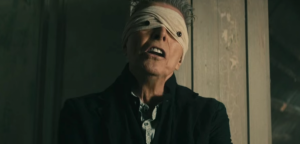BY A.G. MOORE
It is Monday, January 11,, 2016. I have been listening to David Bowie’s “Blackstar” all morning. I have not showered and I have not had coffee. I’ve been watching the internet grieve over a superstar we all felt we knew intimately. I’ve wondered what that felt like for the shapeshifter born David Robert Jones—a deep and public intimacy with millions. But mostly I have been distracted.
So many memories have been drifting to the surface of my mind, memories I have never once revisited (does this mean they were not memories yet but something else?) and whose thread is not immediately traceable. I’ve been feeling very young and very old. I do not feel sad, not exactly, so much as numb. It’s a specific numbness that always accompanies news of mortality, a numbness where I blankly realize the people, places, things I’d assumed would always be there.
The New York Times was right to use the word “transcend” in their headline announcing David Bowie’s death. More than a music icon, his career was my first taste of alter ego: not simply another self, as the Latin suggests, but Cicero’s “second self, a trusted friend.” Suddenly, all manner of seams became apparent: rock’n’roll was theatre, gender was performance, and identity was this protean thing one could play with. And maybe, just maybe, that deeply alien thing inside you, the thing that made you feel like a stranger in crowded rooms, maybe that was the thing that made you work. It would be your saving grace and your compass needle. You were not an individual. You were a freak. Which was something like being a saint.
At the same time, whatever story you’d been telling yourself about yourself—you could abandon that narrative and start again. You had only to cut your hair, don an eye patch, move to Berlin, go to the movies, make sex a moving target, be Pontius Pilate, be a vampire, create a labyrinth.
And the artifice was sweet. Perhaps, even, true. The flickering of that falseness asked which is alter and which is ego? It revealed something you could not dress in words.
I was twelve years old when Best of Bowie was released. I lived in Tuscaloosa, Alabama. I sat in my room staring at the album cover, a collage of various Bowie faces pieced together across the years and selves. There were admittedly few deep cuts on that disc, but 2002 was also the year I really discovered the internet. Soon I was pirating music, exhausting fan pages, and lying about my age (and gender) in chat rooms.
If I had been a slightly weirder child, I could have mapped out my music-art-and-sex reeducation starting there. Innumerable breadcrumbs of pop culture constellated out—The Stooges, Lou Reed, Andy Warhol, Oscar Wilde, Velvet Goldmine, Dada—with Bowie at the center. A whole geography of outsiders emerged, made of cigarette smoke, smeared lipstick, and albums that started with the end of the world.
Bowie did not just have fans. He had followers and disciples. The seeming ease of music fandom belies how bizarre a match it is. There are a lot of subtle tricks that come with crafting a pop identity, marketing to a target audience, and making it feel like serendipity. It’s a love affair with someone who doesn’t know you exist, providing reliable bookmarks across your inner life. Any parallels between “Rock’N’Roll Suicide” and your lived experience do not point to Bowie’s sympathy so much as the elegance of accidents. When you find a song your neurons love to trace and trace again, it starts to feel like it is yours.
There was nothing I wanted more in seventh grade than to be glam rock. That is a wince-worthy sentence because it is every bit as laughable as it is accurate. I dyed my hair various shades of red and purple. I cut the crotch out of red fishnets and wore it as a shirt. I aspired to be the glitteriest gay man to come out of 1970s London. That I was a friendless Alabama girl in the new millennium posed only the dimmest conflict. My aesthetic epiphany would have proved more potent had I attended middle school some thirty years earlier, but I did convince my mother that Hedwig and the Angry Inch would be a great movie to watch with the family. So, we can call it a draw.
A decade and a half later, there is one question I keep asking myself, then dismissing as unanswerable: would I have known I was queer if not for Ziggy Stardust? Where do the seeds of transgression start? I was a shy child. I wanted simultaneously to be deserving of attention and to escape scrutiny. To the glam rock twelve year old, that seemed like an impossible contradiction. Now I think it is not so much to ask.
Stardust was not interesting to me because he wore makeup and odd clothes. He was interesting to me because he seemed sexless, neither male nor female. I loved looking at him but more than that, I was taken with that “neither” space. In the newly released videos for “Blackstar” and “Lazarus,” Bowie is blindfolded, waxing prophetic like an interstellar Tiresius. The visual allusion is eerily fitting: a seer both sightless and clairvoyant, who lived as both man and woman.
The blindfold also obscures two of Bowie’s most recognizable traits: those uneven eyes, blue and false-brown, open at different apertures—which for decades suggested the saddest happy thing to a young person’s ears.
Maybe there was a reason behind your loneliness. Maybe you were from the stars. Regardless of personal tastes, this much is true: important music makes us not only fans, but more ourselves. Because David Bowie existed, we get to be many selves. He proved deviance was a kind of art. And vice versa.
![[PANK]](https://pankmagazine.com/wp-content/themes/pank/assets/images/pank-logo-large.png)

